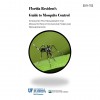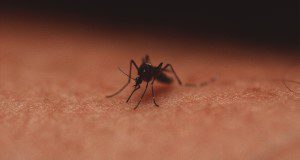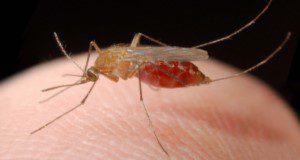The Prevent & Protect publication series focuses on the creation of different material formats to resonate with various audiences and ways to maximize their efficacy in communicating risk to the public about mosquito control. The overview of the Prevent & Protect project, developed by the UF/IFAS Center for Public Issues Education in Agriculture and Natural Resources (PIE Center), can be found in EDIS publication AEC694/WC357, Public Perceptions of Mosquitoes and Mosquito Control. This new 3-page document describes the importance of understanding and adapting to public perceptions of information sources and how scientists can adapt their research findings based upon the needs of professionals in the field to create usable outreach materials. Written by Shelli Rampold, Ricky Telg, Alena Poulin, Sandra Anderson, Angela B. Lindsey, Ashley McLeod-Morin, and Phillip Stokes, and published by the UF/IFAS Department of Agricultural Education and Communication.
https://edis.ifas.ufl.edu/wc358
Tag: Mosquito Control
Public Perceptions of Mosquitoes and Mosquito Control
The Prevent & Protect publication series focuses on the creation of different material formats to resonate with various audiences and ways to maximize efficacy in communicating about mosquito-related risks and mosquito control topics to the public. This new 3-page publication of the UF/IFAS Department of Agricultural Education and Communication provides a background of public opinion on various aspects of mosquito control covered in the Prevent & Protect campaign. Written by Shelli Rampold, Ricky Telg, Alena Poulin, Sandra Anderson, Angela B. Lindsey, Ashley McLeod-Morin, and Phillip Stokes.
https://edis.ifas.ufl.edu/wc357
Integrated Pest Management for Mosquito Reduction around Homes and Neighborhoods
 This 40-page publication describes how homeowners can use an integrated pest management (IPM) program to help decrease pesticide use, reduce the risk of contracting mosquito-borne diseases, and ease the financial burden on local governments responsible for area-wide control. Modern mosquito control emphasizes source reduction to eliminate areas where mosquitoes thrive; surveillance to determine whether pesticide applications are necessary; screening; sanitation; and other techniques described in this document. The methods recommended in this publication are particularly effective in reducing mosquitoes that transmit diseases. Homeowners who take responsibility for identifying and eliminating sources of mosquito production around their homes and neighborhoods will improve health and quality of life for all Florida residents. Written by C. R. Connelly, E. Bolles, D. Culbert, J. DeValerio, M. Donahoe, K. Gabel, R. Jordi, J. McLaughlin, A. S. Neal, S. Scalera, E. Toro, and J. Walter, and published by the UF Department of Entomology and Nematology, September 2014.
This 40-page publication describes how homeowners can use an integrated pest management (IPM) program to help decrease pesticide use, reduce the risk of contracting mosquito-borne diseases, and ease the financial burden on local governments responsible for area-wide control. Modern mosquito control emphasizes source reduction to eliminate areas where mosquitoes thrive; surveillance to determine whether pesticide applications are necessary; screening; sanitation; and other techniques described in this document. The methods recommended in this publication are particularly effective in reducing mosquitoes that transmit diseases. Homeowners who take responsibility for identifying and eliminating sources of mosquito production around their homes and neighborhoods will improve health and quality of life for all Florida residents. Written by C. R. Connelly, E. Bolles, D. Culbert, J. DeValerio, M. Donahoe, K. Gabel, R. Jordi, J. McLaughlin, A. S. Neal, S. Scalera, E. Toro, and J. Walter, and published by the UF Department of Entomology and Nematology, September 2014.
http://edis.ifas.ufl.edu/in1045
Mosquito Control Impoundments (ENY648S/IN192)
 A mosquito control impoundment is a salt marsh or mangrove forest with an earthen dike around the perimeter that allows the area to be artificially flooded during the mosquito breeding season. Since the seventies, research has shown that impounding can have severe environmental impacts on the marshes and the adjoining estuary. So, over 12,600 hectares of the original 16,185 of impoundments have been rehabilitated in some fashion. This 6-page fact sheet was written by Jorge R. Rey and C. Roxanne Connelly, and published by the UF Department of Entomology and Nematology, June 2012.
A mosquito control impoundment is a salt marsh or mangrove forest with an earthen dike around the perimeter that allows the area to be artificially flooded during the mosquito breeding season. Since the seventies, research has shown that impounding can have severe environmental impacts on the marshes and the adjoining estuary. So, over 12,600 hectares of the original 16,185 of impoundments have been rehabilitated in some fashion. This 6-page fact sheet was written by Jorge R. Rey and C. Roxanne Connelly, and published by the UF Department of Entomology and Nematology, June 2012.
http://edis.ifas.ufl.edu/in192
ENY149/IN813 Mosquito Control and Beekeepers
ENY-149, a 3-page fact sheet by Jamie Ellis and Jerry Hayes, addresses the concern among beekeepers in Florida over mosquito control programs and how they may impact honey bee colonies. Published by the UF Department of Entomology and Nematology, December 2008.
http://edis.ifas.ufl.edu/IN813

